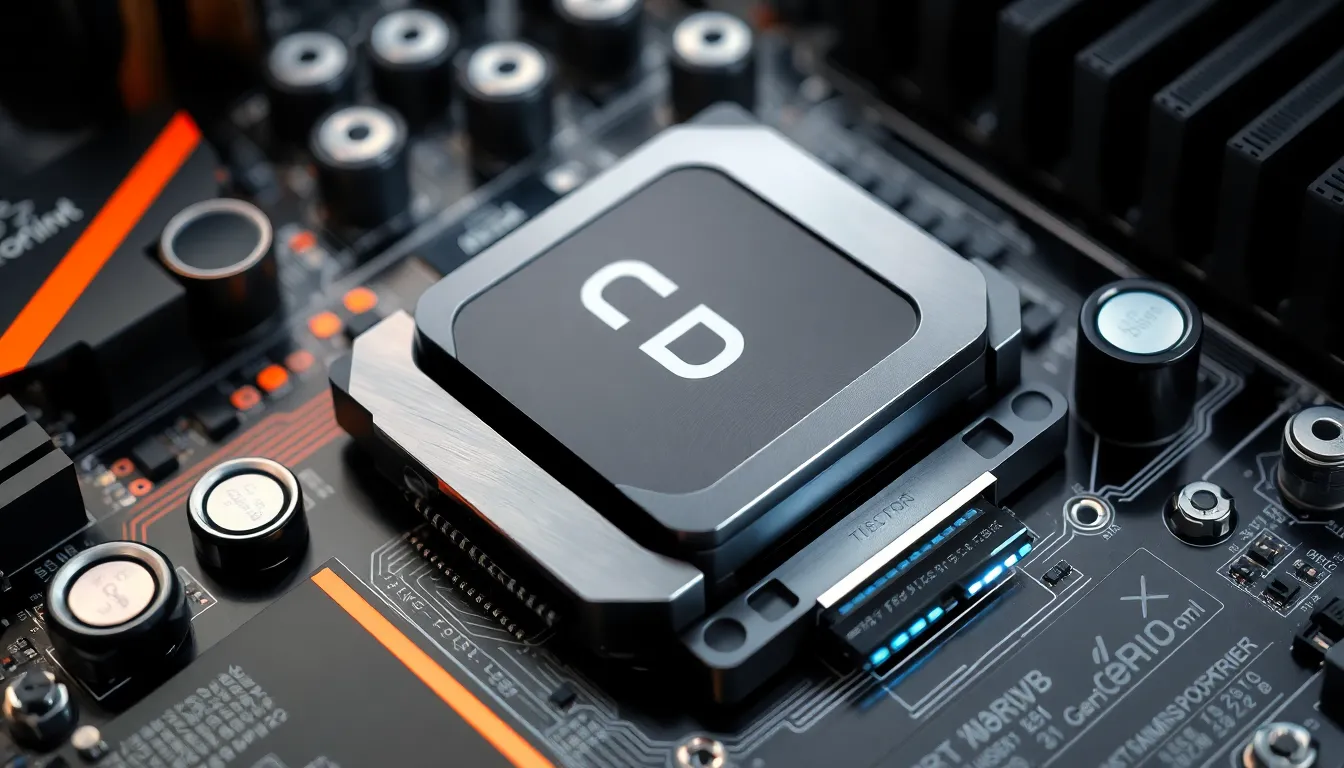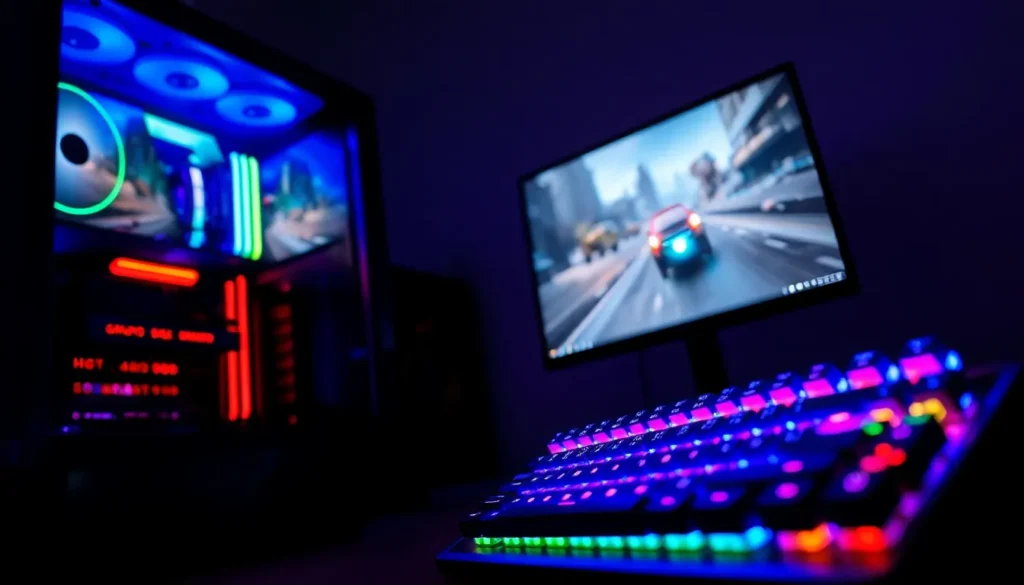In the world of gaming, where every millisecond counts, players often find themselves pondering a crucial question: does the CPU really affect FPS? Picture this: you’re in the heat of battle, adrenaline pumping, and suddenly, your frame rate drops like a rock. It’s enough to make anyone scream louder than a banshee at a rock concert.
Table of Contents
ToggleUnderstanding FPS and Its Importance
Frame rates, or FPS, reflect the number of frames displayed per second in a video game. High FPS ensures smoother gameplay, enhancing the gaming experience. Optimizing FPS minimizes lag and stutter, crucial during fast-paced gaming moments.
Gamers often prioritize FPS to maintain fluid motion and respond swiftly. For example, titles like first-person shooters can be more engaging with higher frame rates, directly impacting player performance. A frame rate of 60 FPS is generally considered the standard for enjoyable gameplay. However, competitive players aim for rates above 144 FPS to gain a tactical advantage.
FPS influences player immersion as well. The visual quality of gameplay enhances when frame rates stay consistently high. Lower frame rates can lead to disjointed visuals, where animations appear choppy. Players may face difficulty in tracking fast movements, resulting in missed opportunities and diminished enjoyment.
Understanding FPS also equips gamers to make informed hardware choices. Higher-performing CPUs and graphics cards directly affect frame rates. In turn, balancing components ensures that games run smoothly. A powerful CPU prevents bottlenecks, allowing the graphics card to perform optimally.
Overall, FPS plays a vital role in gaming, affecting not just performance but also enjoyment. Continuous improvement in frame rates leads to a more immersive and competitive environment. High FPS can transform a player’s experience, ultimately contributing to success in gaming.
The Role of the CPU in Gaming

The CPU significantly impacts gaming performance, influencing FPS and overall experience. As games become more complex, reliance on CPU power grows.
CPU Architecture
CPU architecture plays a crucial role in gaming performance. It encompasses the overall design of the processor, including core count and capability. Higher core counts facilitate better multitasking, allowing smoother gameplay when running demanding applications. Gaming demands efficient processing of data, resulting in fast responses to player actions. Different architectures impact how well a CPU handles various gaming scenarios.
Clock Speed and Performance
Clock speed directly affects a CPU’s performance in games. Measured in gigahertz (GHz), higher clock speeds translate to faster processing times for calculations. Most modern CPUs operate between 3.0 GHz and 5.0 GHz, providing sufficient speed for most gaming needs. Games with complex mechanics often require robust clock speeds to minimize lag. Players seeking a competitive edge favor CPUs with higher clock rates to achieve improved responsiveness and overall FPS during gameplay.
How CPU Influences FPS
The CPU plays a key role in determining FPS, affecting gameplay quality directly.
Game Types and CPU Demands
Different game genres exert varying demands on the CPU. Open-world games require significant processing power for large environments and NPC interactions. Real-time strategy games often rely on CPU efficiency for handling multiple units and simultaneous calculations. First-person shooters prioritize quick responsiveness, making fast CPU performance crucial. In contrast, casual puzzle games may not require as much CPU power to maintain satisfactory frame rates. As gaming evolves, understanding these demands helps gamers select CPUs that optimize performance for their preferred genres.
Bottlenecking Explained
Bottlenecking occurs when one component limits the performance of others, often impacting FPS. A powerful GPU paired with a weak CPU leads to situations where the CPU can’t process data quickly enough, resulting in lower frame rates. Conversely, an underwhelming GPU with a robust CPU means that the graphics can’t keep up, still affecting FPS. Gamers must balance these components to prevent bottlenecking and achieve optimal performance. Monitoring performance metrics can identify bottlenecks, ensuring a smooth gaming experience.
Other Factors Affecting FPS
While the CPU significantly influences FPS, several other components crucially affect gaming performance.
GPU Considerations
The graphics processing unit (GPU) plays a pivotal role in rendering frames in games. A powerful GPU increases the likelihood of achieving higher FPS, especially in graphically demanding titles. High-quality textures, complex shaders, and advanced graphical effects require robust GPU performance. Additionally, the resolution at which a game is played places further demands on the GPU. When gamers opt for 1440p or 4K resolution, GPU capability becomes an essential factor in maintaining smooth frame rates.
RAM and Storage Impacts
Random Access Memory (RAM) affects FPS by allowing games to load and run smoothly. Insufficient RAM can lead to stuttering and lag, interrupting gameplay. At least 16 GB of RAM is recommended for most modern games to ensure efficient multitasking and performance. Storage type also influences FPS; Solid State Drives (SSDs) offer faster load times compared to traditional Hard Disk Drives (HDDs). Gamers notice quicker loading screens and improved overall performance with SSDs, resulting in a more seamless gaming experience.
The relationship between CPU performance and FPS is undeniable. A capable CPU ensures smooth gameplay and responsiveness, especially in demanding titles. Gamers must consider their CPU alongside the GPU to avoid bottlenecking and achieve optimal frame rates.
As games evolve and require more processing power, the importance of a robust CPU becomes even clearer. Balancing hardware components is essential for enhancing the gaming experience. Ultimately, understanding how CPU affects FPS empowers gamers to make informed choices, leading to improved performance and greater enjoyment in their gaming adventures.





